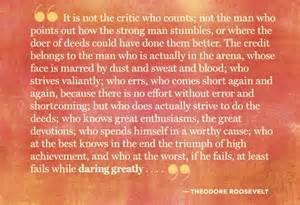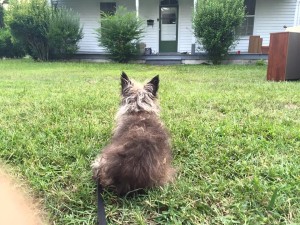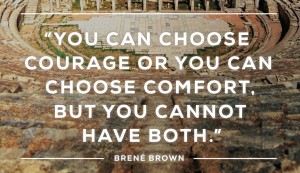Teaching
now browsing by tag
Risks and Rewards

I didn’t set out for this to be a year of saying yes to everything that scares me, but I have intentionally, unintentionally, and somewhat haphazardly taken some big and small risks this year. Since I spent last week, as Dr. Brene Brown describes it using the Franklin Delano Roosevelt quotation, face down in the arena, I’ve spent this week trying to take stock, figure out what got me there, and how to get back up. Fortunately for me, the universe sent along a few reminders. 
Though I find the “just get through it” mentality generally serves me well. One of the downfalls of this mentality is that sometimes I get so busy “getting through it” that the things I need to process, and actually deal with, tend to stack up.
As someone surrounded by friends and family who face daunting struggles with depression, I consider myself blessed that my own bouts of depression tend to be short-lived, and in some ways purposeful. Sometimes it takes me a while to figure it out, but generally if I am feeling depressed it is a sign that in “just getting through” stuff, I’ve also let things pile up. So, last week when I reached a particularly low point, I knew that part of the process of getting back up would have to be taking stock of things and figuring out how to deal with them.
Please, don’t run screaming, this is not going to be a post where I give you a three step process for solving all my (and/or your) problems. This post is more about identifying the things, taking risks, and their rewards. If you want to run screaming from that, well, now is the time; and, it won’t hurt my feelings if you do.
For me, getting through things often means narrowing my focus and concentrating on putting one foot in front of the other. This a great strategy for the day to day, for things like being fully back in the class room for the first time in five years, or for immersing myself in a sub-field I’ve only dabbled in before, or for re-adapting to life in a smaller, more isolated community. The problem with this narrow focus is it means that when I do stumble I lack the perspective to help me recover. Since I have always managed the day to day stuff fairly successfully, it is natural for me to be hard on myself when I start not coping well with the day to day.
It takes time for me to see the forest for the trees, to fully accept that three and a half months ago my office looked like this: 
that I said good bye to that place, the people I worked with, and my friends: 
that I packed up the DH, the dogs, and said goodbye to this town, the people, and this old house: .
.
I did all of that to take a job I’d applied for in April, and interviewed at in May. A job that carries a similar title and some similar day to day work, but that in reality has vastly different expectations. Basically in about 8 months I changed nearly everything about my day to day life. Yet, my day to day, get through it, coping strategy doesn’t really account for that. Basically, it tells me, “You did this to yourself. Now, suck it up and get going.”
As my last post revealed, it is hard enough for me to admit I miss the people and community I had, I haven’t even started to think about how I miss my standing desk and dual monitor set up, the window in my office, the restaurants I could walk to for lunch. All of those things I know are affecting me physically and emotionally, yet I’m not taking the time to consider them. Really, I am actively berating myself for not dealing better. (Yeah, I know … that is some logic there.) As silly as it sounds, this week I’ve been thinking about / accepting that this move, this new job, this new life they all constitute a very big risk I have taken. Funny, it wasn’t until last week when I felt completely flat on my face that I realized I was even in the arena in a very big way.
Actually, it was a combination of feeling completely defeated, and taking smaller risks that helped me to better accept the big risk I have taken, and to be kinder to myself in this struggle. Last week, I sent a draft of an article to a colleague at another institution. It doesn’t sound like much of a risk, but this is the first time I’ve shared my work outside of my friends and graduate school co-hort. (No, the dissertation does not count, and why is a different discussion.) This colleague graduated from a more prestigious university than I did. She is insanely smart, and I feel like I work to keep up with her in conversation. Though I knew it would ultimately help me, I worried about sharing this not quite first draft with her. It felt like showing my warts. I was worried she would tear my work apart, and that she would be right in doing so. Of course, I didn’t share any of this with her, so today when I received her feedback it felt like a gift. She praised and loved parts of my article, and she gave me wonderful feedback and tips on the other parts … the parts I knew needed more attention. My reward for this risk isn’t the praise an positive feedback she gave; my reward is that she pushed in all the places I knew I needed pushing. She confirmed my own instincts about my writing. Right now, for me, this is a win, and a small risk that I hope will lead to bigger ones.
This is getting long, I know, but just one more thing. The other risk I took this week is having my faculty mentor, who is from the professional education department, observe my class. Being back in the classroom this year has left me all kinds of vulnerable, but this last couple of weeks I have really been feeling it. Listening to other people in the department talk about their composition classes, it’s become clear to me that I have a very different pedagogy, and structure my class quite differently. The most obvious way I have done that is by making my class read, think, and talk about race. (I did mention that I moved North of North, right?) Since they are all working on their own topics and projects, we needed an example to talk about in class, so I structured a series of readings focused on race in America, which started with whiteness and ended with Rachel Dolezal.
Whenever I talked about the readings and discussions our class was participating in, my colleagues would talk about how brave I was, or seem incredulous that I would bring these issues up with my class. There were conversations that were a struggle, but, for me, it all paid off as I listened to this class talk about Ta-Nehisi Coates The Case for Reparations. (Yes, they read it, and yes they owned the discussion.) The reactions of my colleagues began to have an effect though. I worried, was I forcing my view on them. I’d done my best in class not to impose my opinions, but, given my authority in the classroom, even bringing up this issue could be considered imposing it on the students. I also worried if I’d gotten too far into the readings / discussion, and neglected the writing. Last week, in a meeting before class one of the students thanked me for making them think about and talk about race. I won’t lie, that made me feel good.
Last night, when I was talking with my mentor about the class she shared two things. First, the class said they enjoyed that I was making them talk about hard issues. (The student who’d thanked me last week was absent, so this was coming spontaneously from other students in the class.) Second, the feed back she and the class gave me about where class / my teaching could improve, confirmed what I’d already been thinking. Again, that the class didn’t hate me for making them wrestle with a difficult issue, was important good feedback. More important for me though, was the confirmation that what I suspected needed work was also what they felt needed work. It was another confirmation that the risk was worth it, and of my own instincts.
Yes, I took these small risks, and in doing so I learned I am not the perfect writer or the perfect teacher. I also learned, however, to trust my own instincts about how to become better at both. I can also hope that the positive results of these smaller risks are good omens for the much bigger risk I have taken with this move. I am definitely not comfortable right now, so I guess the least I can do is be courageous.








 D5 Creation
D5 Creation